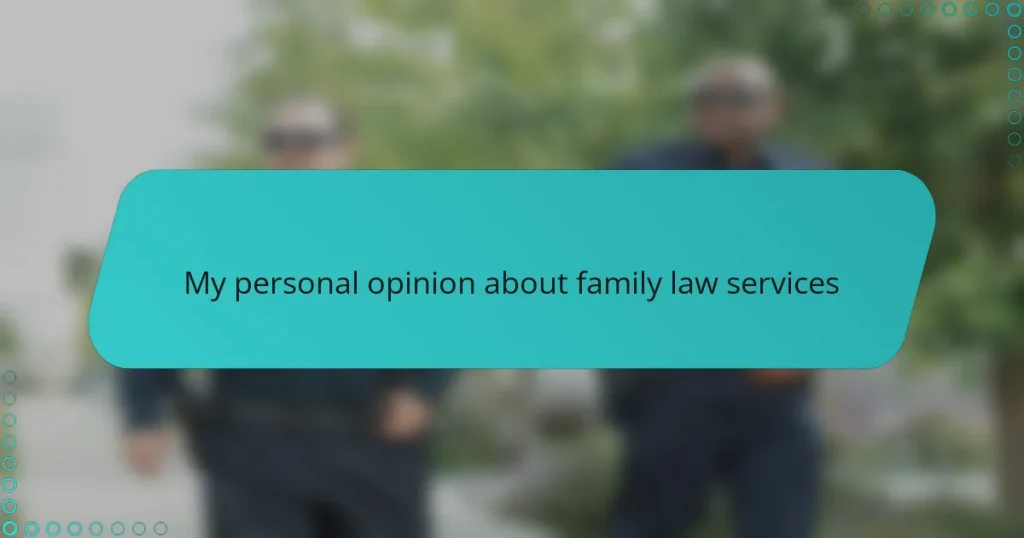Key takeaways
- Effective legal advocacy in family law requires deep listening and personal connection to empower clients during vulnerable times.
- Key factors in family law services include clear communication, emotional support, and sensitivity to individual family dynamics.
- Challenges such as high emotions and lengthy procedures highlight the need for advocates who provide consistent guidance and empathy.
- Improving outcomes involves fostering collaboration, clarifying expectations, and offering ongoing emotional support throughout the legal process.
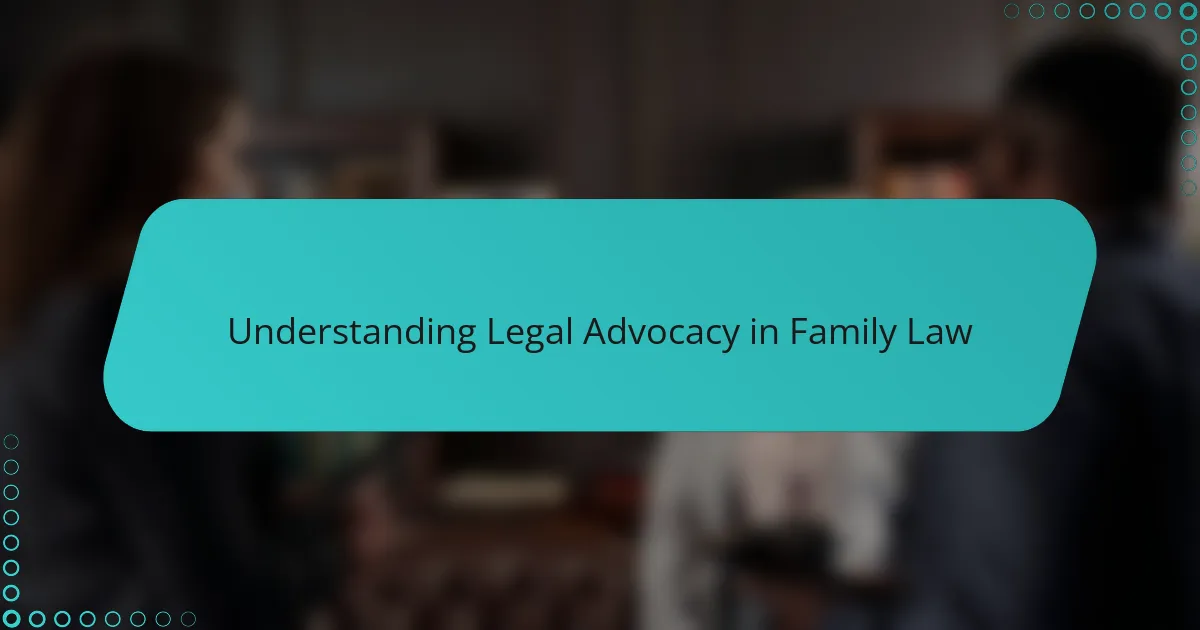
Understanding Legal Advocacy in Family Law
Legal advocacy in family law is more than just navigating paperwork; it’s about standing up for people during some of their most vulnerable moments. I’ve seen firsthand how a dedicated advocate can transform confusion and fear into clarity and confidence. Have you ever wondered how someone manages to protect their rights while also preserving the emotional well-being of their family?
From my experience, effective legal advocacy means listening deeply. It’s about understanding the unique dynamics of each family and tailoring solutions that go beyond the legal text. This personal touch can make all the difference when lives are intertwined with complex emotions and histories.
What struck me most is how advocacy isn’t just about winning a case—it’s about empowering clients to feel heard and supported. It’s a challenging but rewarding role, especially in situations where the stakes are personal and profound. Isn’t that what true legal support should be?
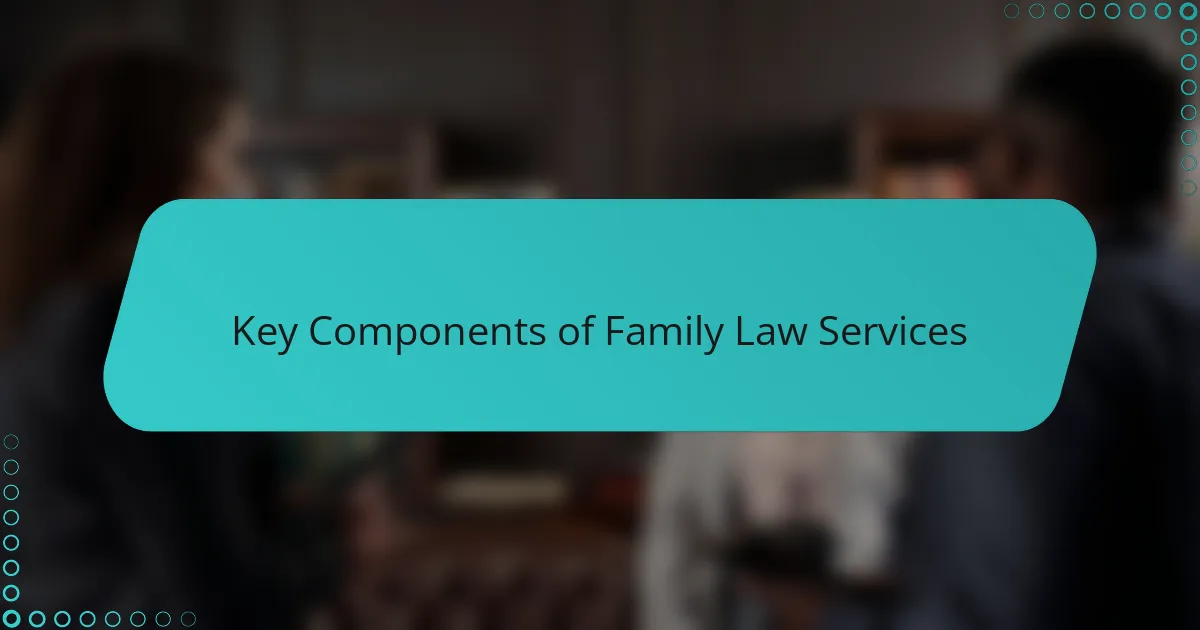
Key Components of Family Law Services
One of the core components of family law services is custody and visitation arrangements. I recall working with a client who was overwhelmed by the uncertainty of seeing their children. Crafting a custody plan that prioritizes the children’s best interests while respecting both parents’ roles gave that family a sense of stability they desperately needed.
Another essential aspect is the division of marital property and financial support. Splitting assets and negotiating support can feel like navigating a minefield of emotions and legal complexities. I’ve seen how clear communication and empathetic guidance during this process helped clients move forward without bitterness or confusion.
Finally, family law often involves addressing sensitive issues like domestic violence or child protection. When clients share their fears, it’s not just about legal protection—it’s about safety and trust. I find that providing a safe space for these conversations is just as crucial as the legal solutions offered. Have you ever thought about how much courage it takes to reach out for help in these situations?
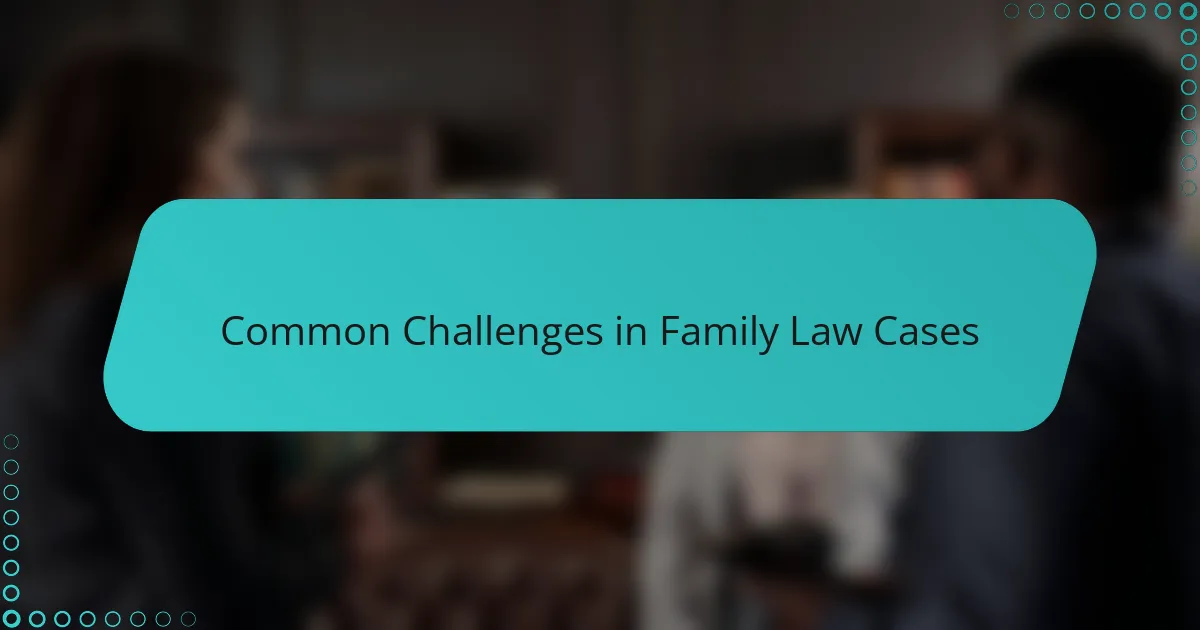
Common Challenges in Family Law Cases
In my experience, one of the toughest challenges in family law cases is managing the high emotions that often accompany them. I remember a case where both parties were so consumed by anger and fear that it felt impossible to reach any common ground. How do you find peace when pain runs so deep? This emotional turbulence can make negotiations feel like walking on a tightrope.
Another challenge that frequently arises is the complexity of balancing legal rights with the best interests of children. I’ve seen parents struggle with the idea that the law doesn’t always offer simple answers. It’s heartbreaking when “winning” a case doesn’t guarantee the well-being of the kids involved. Have you ever wondered how advocates handle such delicate decisions daily?
Then there’s the practical hurdle of navigating lengthy court procedures and paperwork, which can wear down even the strongest clients. I’ve guided many through the maze of forms, deadlines, and hearings, and I know firsthand how exhausting it can be. Yet, patience and persistence often become the quiet heroes in these battles. Does anyone ever truly prepare for the endurance needed in the legal system?
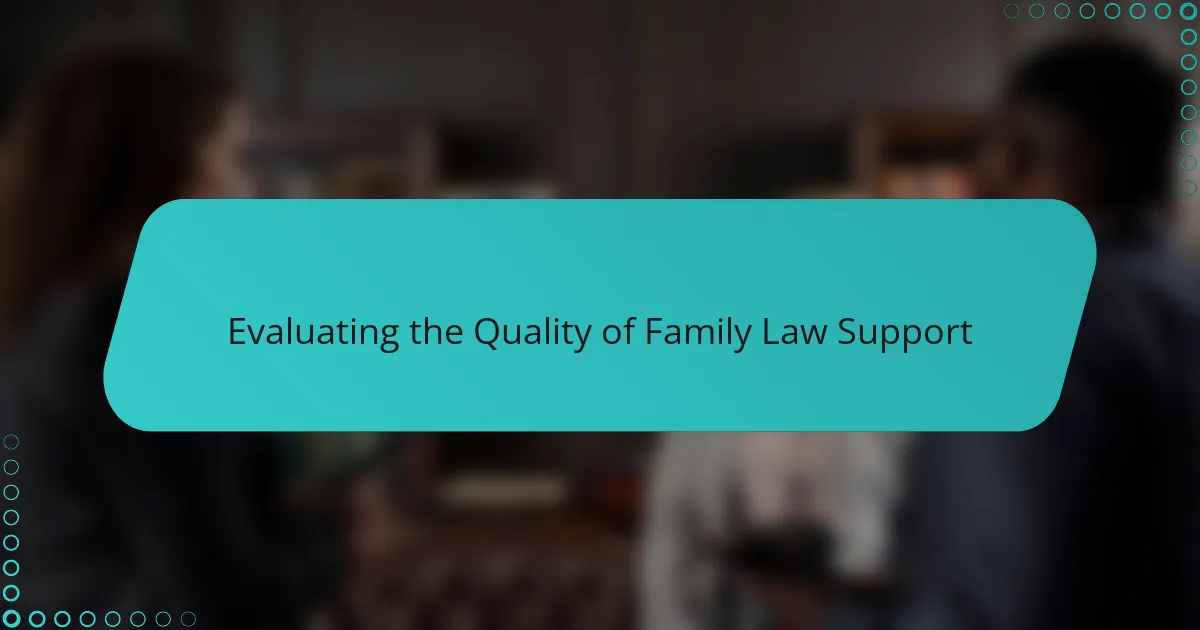
Evaluating the Quality of Family Law Support
Evaluating the quality of family law support often comes down to how well the advocate understands the unique story behind each case. I remember a situation where a lawyer’s attentiveness to small details—things that others might overlook—made all the difference in crafting a solution that truly fit the family’s needs. Have you noticed how those little nuances can change the entire outcome?
Another sign of strong family law support is transparency and clear communication. In my experience, clients feel a lot less overwhelmed when they’re not left in the dark about what’s happening or what to expect next. It’s that steady guidance, even during the toughest moments, that builds trust and eases anxiety.
Finally, I’ve found that quality family law services don’t just aim for legal victory—they aim for emotional support as well. I once saw a client leave a consultation feeling not just legally prepared, but genuinely hopeful. How often do you think legal services manage to uplift spirits while handling challenging family disputes? That balance, to me, defines true quality.
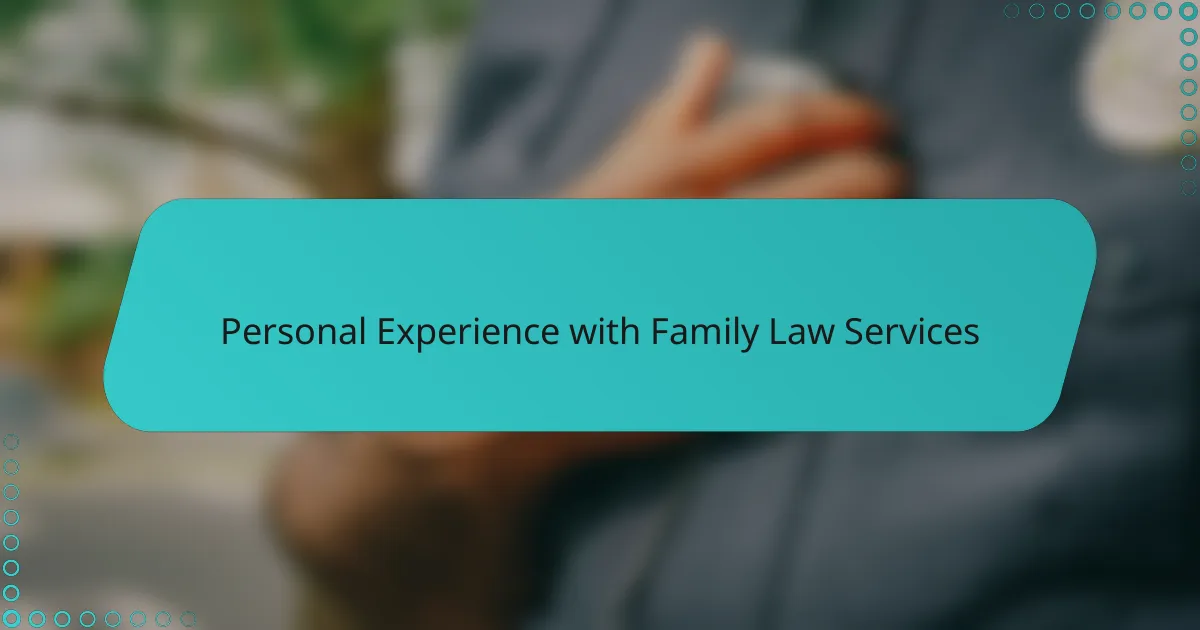
Personal Experience with Family Law Services
I’ve had clients share stories that linger long after the case ends—moments when a single conversation with their lawyer shifted their entire perspective. It’s powerful to witness how personalized attention in family law services can soothe anxiety and build resilience amid turmoil. Have you ever experienced how a compassionate ear can make legal battles feel less isolating?
One case that stands out involved a mother navigating a complex custody dispute. The legal advice alone wouldn’t have sufficed; it was the encouragement and steady presence of her advocate that gave her the strength to face each hearing. This taught me that family law services extend far beyond statutes—they touch the very heart of human experience.
Sometimes, I wonder how many people underestimate the emotional toll these cases take. From my viewpoint, effective family law services should not only resolve legal issues but also honor the emotional journeys we all endure during such challenging times. Isn’t it remarkable how legal support and empathy must go hand in hand?
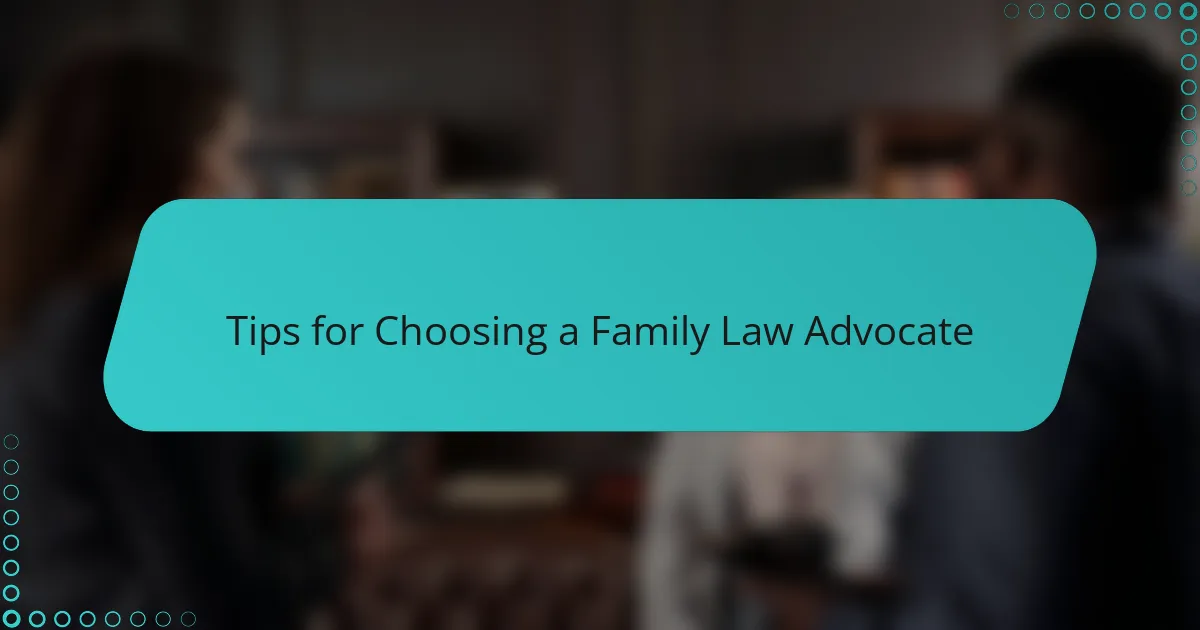
Tips for Choosing a Family Law Advocate
Choosing the right family law advocate can feel overwhelming, but from my experience, the key is to find someone who listens—not just to your words, but to the emotions behind them. Have you ever had a professional who seemed genuinely attuned to your story? That kind of connection often marks the difference between just legal advice and meaningful advocacy.
Another tip I’ve come to value is looking for clear and honest communication. I once worked with a client who felt lost because their advocate rarely explained the steps ahead. When we shifted to a professional who kept them informed and answered questions promptly, the whole process became less daunting. Isn’t it reassuring to know what’s happening and why it matters?
Lastly, don’t underestimate the importance of empathy in family law services. I remember a case where the advocate’s kindness helped a client regain confidence after a painful separation. It made me realize that legal skill alone isn’t enough—an advocate must also be a steady emotional support. Have you considered how much comfort this can bring during such a turbulent time?
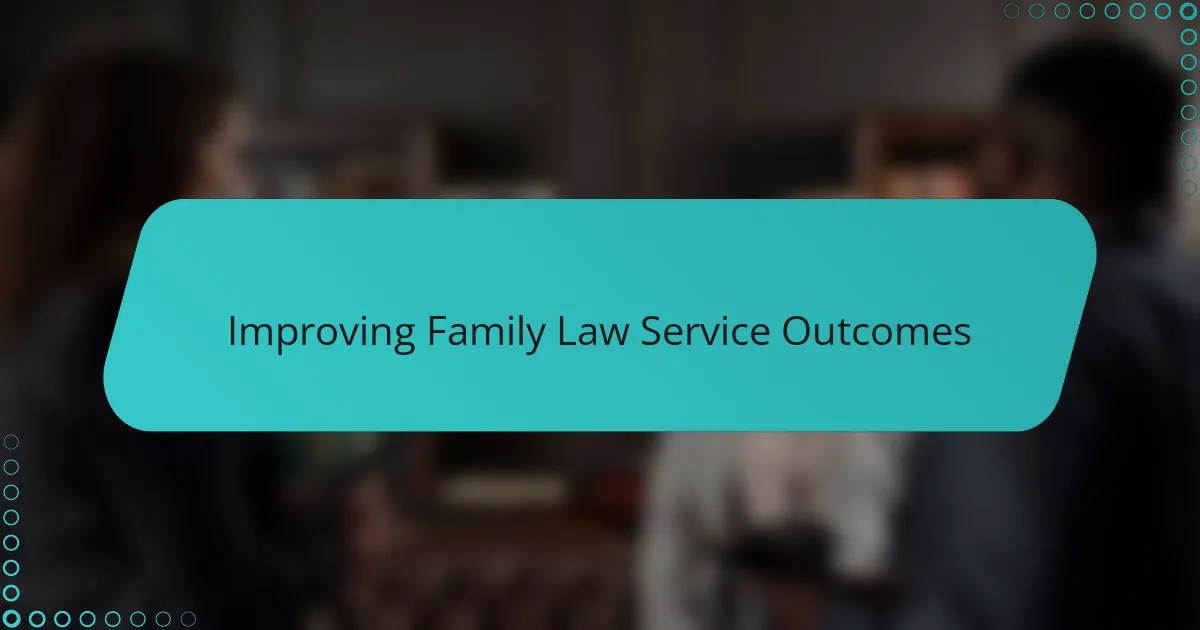
Improving Family Law Service Outcomes
Improving family law service outcomes, in my view, hinges on more than just legal expertise; it’s about creating a collaborative environment where clients feel genuinely supported. I remember a case where involving both parents in mediation, rather than jumping straight to litigation, led to a resolution that everyone could live with. Isn’t it amazing how peaceful dialogue can sometimes untangle what seemed hopeless?
I also find that early and clear communication dramatically improves outcomes. When clients know what to expect at every stage, fear and frustration often give way to confidence. Have you ever noticed how just understanding the process eases so much anxiety?
Lastly, incorporating ongoing emotional support within family law services can’t be overstated. From my experience, clients who receive consistent encouragement alongside legal advice tend to navigate their challenges more resiliently. Could this be the missing piece in many family law journeys?
